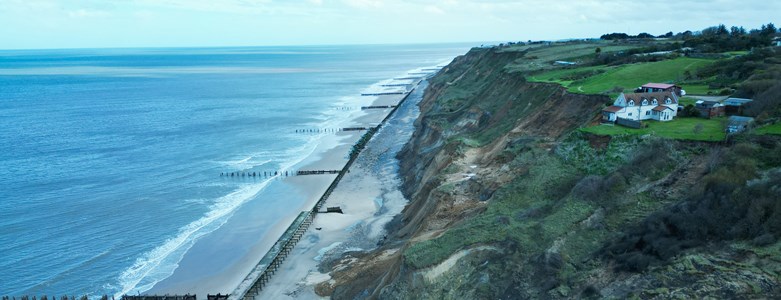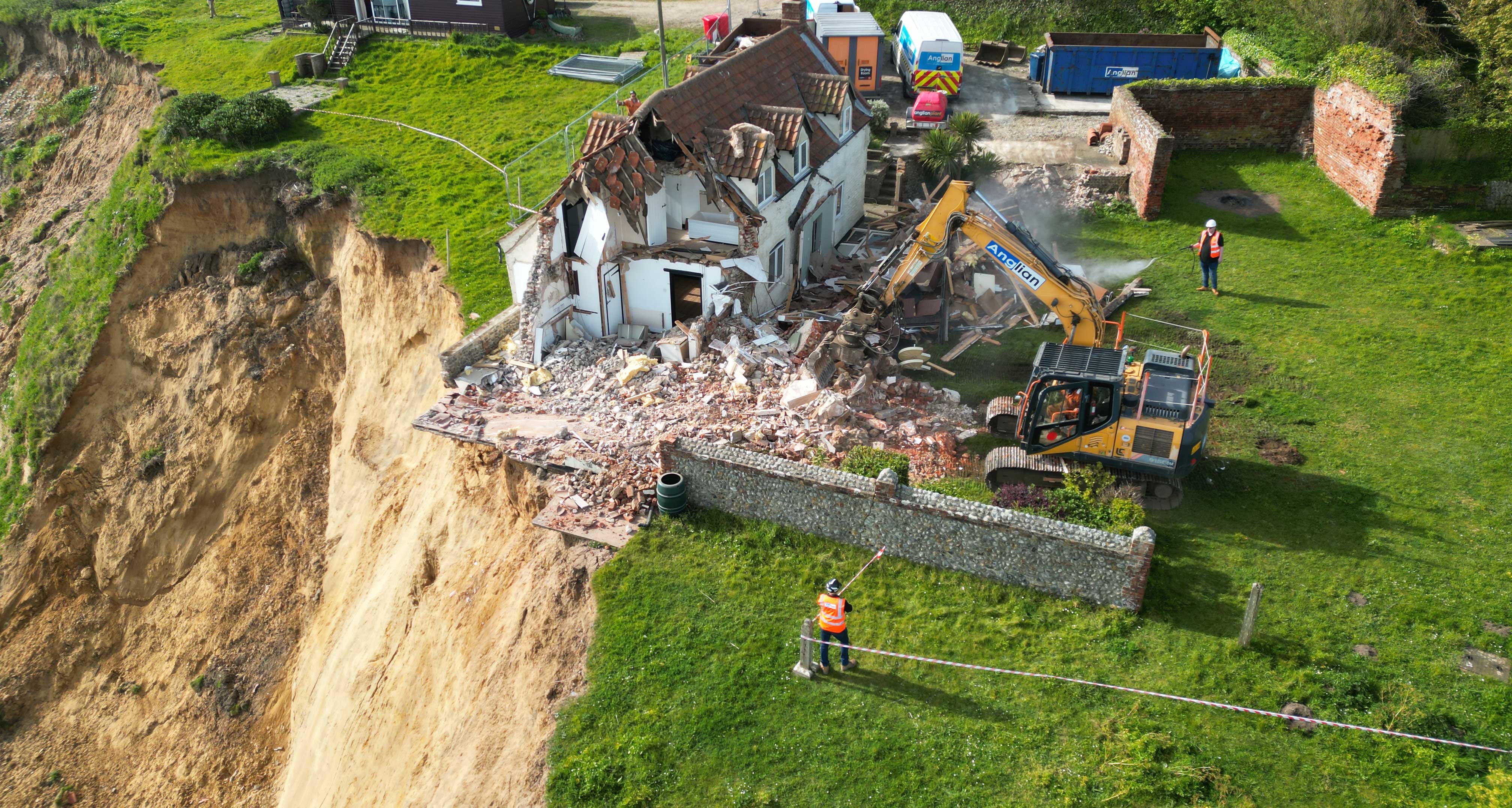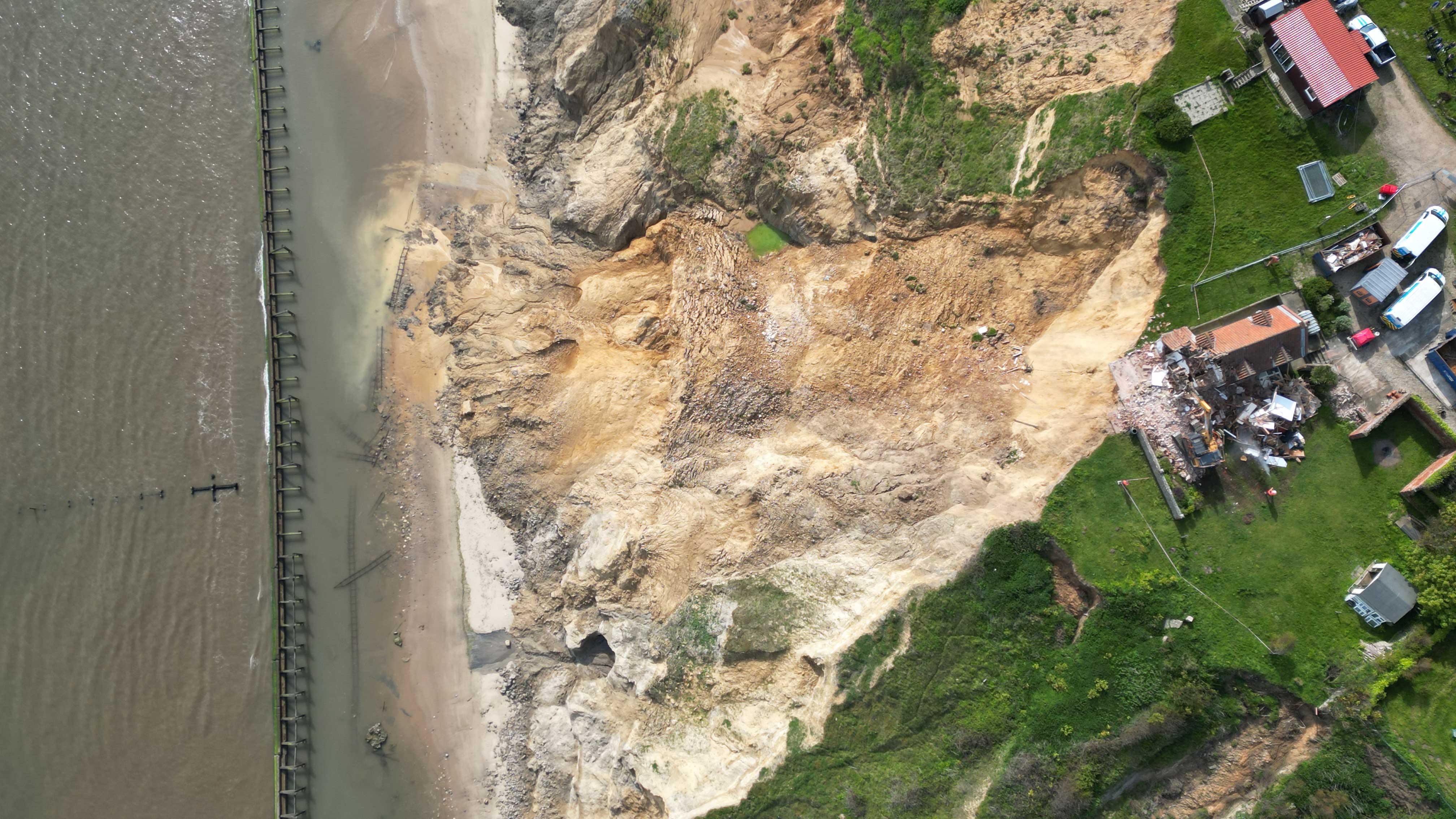Demolition started on Cliff Farm in Trimingham

Date published: 10th May 2024
A programme of works to demolish a property at Trimingham has started today, with the support of the North Norfolk District Council.
This necessary demolition follows the significant cliff slip which occurred prior to the Easter Weekend, and resulted in part of the property’s external façade being left suspended in the air.
Council officers assessed the site and with the full agreement of the property owner, decided that demolition was the only safe option, given the significant risk to both the occupants and to the public from the accessible beach below.
Demolition began early Friday morning, with a challenging operation to take down the 18th century farmhouse.
 Demolition of Cliff Farm in Trimingham
Demolition of Cliff Farm in Trimingham
The Council’s Coastwise Team have been working closely to support the property owner throughout the process.
Cllr. Harry Blathwayt, portfolio holder for Coast said:
“This has been a sad and testing day - the owner of this property has my deep sympathy on what must have been a gruelling event in his life.
However, I am proud of the professionalism and skill of the Coastwise team in dealing with such a difficult operation so well and the support they have given to all concerned - my thanks go to all involved.
The Council will continue to support those living along our coast in the face of the challenges we are experiencing and will continue to experience with the effects of global warming.”
 Demolition of Cliff Farm in Trimingham
Demolition of Cliff Farm in Trimingham
Martyn Fulcher, Director for Place and Climate Change said:
“Demolishing a property with such a proximity to the cliff edge is a challenging operation and the Council is pleased that it could be carried out safely, and that we have been able to support the property owner through our Coastwise team in this difficult time.”
The cliff failure was due to natural process and the prolonged saturation of the materials in the cliff over the winter may have contributed. Cliffs in this section of the coast are complex and dynamic – the interaction of groundwater with the geology of the cliff plays a significant role in cliff failures and these are exacerbated by periods of heavy rainfall.
The Council has been able to support this demolition financially through an existing, legacy fund it created a number of years ago for such eventualities where such cases do not qualify for national government funding however this funding is nearly depleted, and our Coastwise programme are investigating possible future opportunities for such cases alongside broader options and support for communities that may be at risk.
There are currently no Government compensation schemes for properties lost to coastal change.
Coastwise is part of the Environment Agency/DEFRA Coastal Transition Accelerator Programme and is an initiative that is working with individuals, communities, businesses, infrastructure owners, government, and others to explore and demonstrate how coastal places can plan and take actions to prepare and transition from coastal erosion risk. This Coastwise programme is providing local assistance whilst also delivering national learning to help shape how the nation supports and responds to coastal change in the future.
Find out more about Coastwise, including FAQs at www.north-norfolk.gov.uk/coastwise
Find out more about the Coastal Transition Accelerator Programme
Demolition of Cliff Farm, Trimingham – Q&As
Why are North Norfolk District Council demolishing the house?
Following a significant cliff slip just prior to the Easter weekend Council officers assessed the site and agreed with the owner that demolition was the only safe option, given the risk to occupants and to the publicly accessible beach below.
Why has it taken a few weeks since the slip occurred for demolition to take place?
NNDC have been working with the owner to support him through the process of losing his home and make the necessary arrangements such as ecological and asbestos surveys, risk assessments and to appoint a suitable contractor.
Has the owner received support through the process?
NNDC have offered ongoing support for the owner to help guide him through this challenging time. This has included officer time and expertise alongside costs for demolition.
Have NNDC helped them find somewhere new to live?
Anyone in this situation can access support through the Council’s Housing Advice service if required. We have been in continuous dialogue with the owner about his options.
What caused the cliff slip?
The cliffs along this stretch of coast are complex and dynamic. The interaction of groundwater with the geology plays a significant role in cliff failures, these can occur at any time of the year but may be exacerbated by periods of heavy rainfall. Coastal processes such as beach lowering at the base of the cliff can also contribute to the instability of the cliffs along this part of the coast.
Whose responsibility is it to manage properties at coastal risk?
Ultimately property owners are responsible for their own properties. North Norfolk District Council seeks to provide support where it can.
The Environment Agency have a national strategic oversight of Coastal Risk Management and North Norfolk District Council are the Risk Management Authority. This is primarily for the strategic coastal policies (see Shoreline Management Plan). Where it is not feasible to prevent the coast from changing, policies have identified a need to seek to support communities to transition from coastal change. Coastwise is one of a small number of national projects seeking to explore how this may be best achieved.
Who is carrying out the demolition and how long will it take?
North Norfolk District Council, on behalf of the property owner has arranged the demolition. We have contracted experienced demolition contractors to complete the works. It is anticipated that the demolition will take approximately one day, with two further days to sort and clear the materials.
How dangerous is this demolition given its location – to contractors or to the public?
All demolitions need to be carefully completed and the contractors have assessed as to how best to carry out the work. The proximity to the cliff is a factor that has been considered. Ideally it would be better to demolish well in advance, but this is often not a preferable option for property owners and there is no legislative requirement in place. Coastwise is exploring how to develop opportunities for property owners who are facing coastal risk so that they are able to make choices earlier.
Who is paying for the demolition to be carried out?
Many residential properties (purchased before June 2009) qualify for a national government coastal erosion assistance grant, but this is not the case for Cliff Farm. North Norfolk District Council is paying for the demolition through a fund it set up for such instances a number of years ago. The North Norfolk fund is now nearly exhausted and as such Coastwise is investigating how actions required for coastal transition can be funded into the future (e.g. how demolition is funded/financed in the future alongside many other possible interventions).
What is Coastwise?
Coastwise is an initiative that is working with individuals, communities, businesses, infrastructure owners, government and others to explore and demonstrate how coastal places can plan and take actions to prepare and transition from coastal erosion risk. Coastwise is providing local assistance whilst also delivering national learning to help shape how the nation supports and responds to coastal change in the future.
What is the role of Coastwise in this instance?
Coastwise has co-ordinated support for the property owner, including arranging the NNDC demolition funds, and awarding a Coastwise grant to assist with removing belongings. We are working with the property owner to support him moving forwards.
NNDC, through Coastwise, is seeking to purchase the remaining site of Cliff Farm, including the associated planning policy opportunity to replace the property elsewhere. Currently coastal erosion is not covered by buildings insurance. Coastwise is investigating if other such properties could be insured in a similar way that uninsurable properties at flood risk are insured through FloodRe.
Are North Norfolk District Council, Coastwise or other agencies compensating the owner for the loss of his property?
The government does not provide compensation for properties lost to coastal erosion.
Coastwise has put into place initial grant support for immediately at-risk properties (and communities) and is also looking to offer options such as purchasing properties at immediate risk for which no other adaptation options are possible. There is a need to explore other options for properties which face less imminent coastal erosion risk. We are working with communities to explore what options could look like and how these could be delivered for the medium to longer term.
Why can’t more sea defences like those under construction at Cromer/Mundesley be built here at Trimingham or at other threatened places nearby, like Happisburgh?
In most cases, coastal risk management structures are difficult to design and build, can have negative environmental impacts on local areas and communities, and will need large amounts of local funding. It is unrealistic and unsustainable to continue to protect large parts of the North Norfolk coast. Coastwise is important because we will look to deliver other actions to help those at risk.
New coastal risk management schemes, including physical structures like walls or rock armour, require in-depth evidence and justification showing that the scheme will be beneficial, realistic and will not have negative impacts. When funded entirely or partially by the central government, there are assessments to select the most suitable coastal risk management approach.
These assessments can be categorised into several groups:
- Strategic: is it needed?
- Technical: is it achievable?
- Economic: is it value for money?
- Financial: is it affordable?
- Environmental: what is the impact on the environment?
These assessments need to look at the immediate investment, such as construction, as well as the whole-life impacts of the scheme. Erosion is an important natural process that provides us with beaches and flood and erosion protection elsewhere through natural sediment movement. Stopping erosion everywhere is environmentally unrealistic, as valuable sediment would no longer enter the coastal system.
What more can be done to inform people when buying properties that may be comparatively cheap due to the erosion risks etc?
At present not all searches will identify if a property is in an identified coastal risk zone and the risk will not always be identified in the particulars of a property. As such it is possible to purchase a property without awareness of the implications. Further consideration is needed as to how environmental risks such as coastal change could be included into property sales processes. NNDC though its website does provide information to prospective property purchasers.
How frequent is this kind of event and is it going to become more frequent due to climate change/sea levels rising/rates of erosion etc?
The North Norfolk Coast has been changing for thousands of years and will continue to change into the future. Climate change, notably sea level rise or increased storm events, is expected to increase rates of erosion in the future. As such it is ever more important to prepare for these changes and to ensure that through projects such as Coastwise and the Coastal Transition Accelerator Programme, government, communities, utilities, asset owners, businesses and individuals are better prepared via options and initiatives to ensure our coasts remain vibrant places to live.
What is North Norfolk District Council’s message to people seeing images of this demolition whose homes or businesses may be threatened by erosion?
We are working with our communities to understand the issues around coastal erosion, working together to recognise and mitigate the impacts of coastal erosion risk. The Coastwise project aims to identify pro-active solutions to help affected coastal communities via effective transition options and forward planning.
Last updated: 10th May 2024
